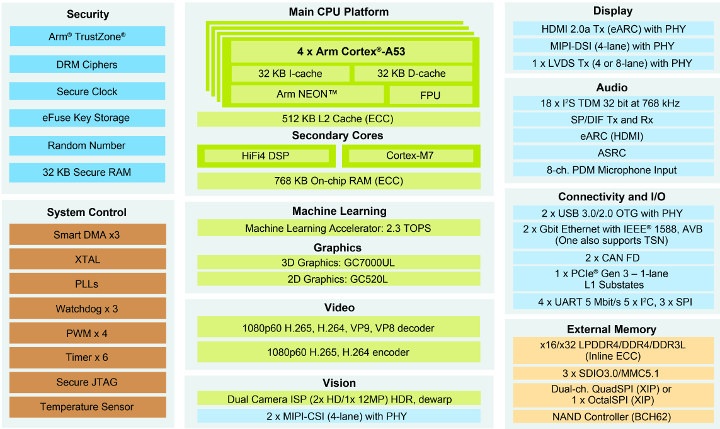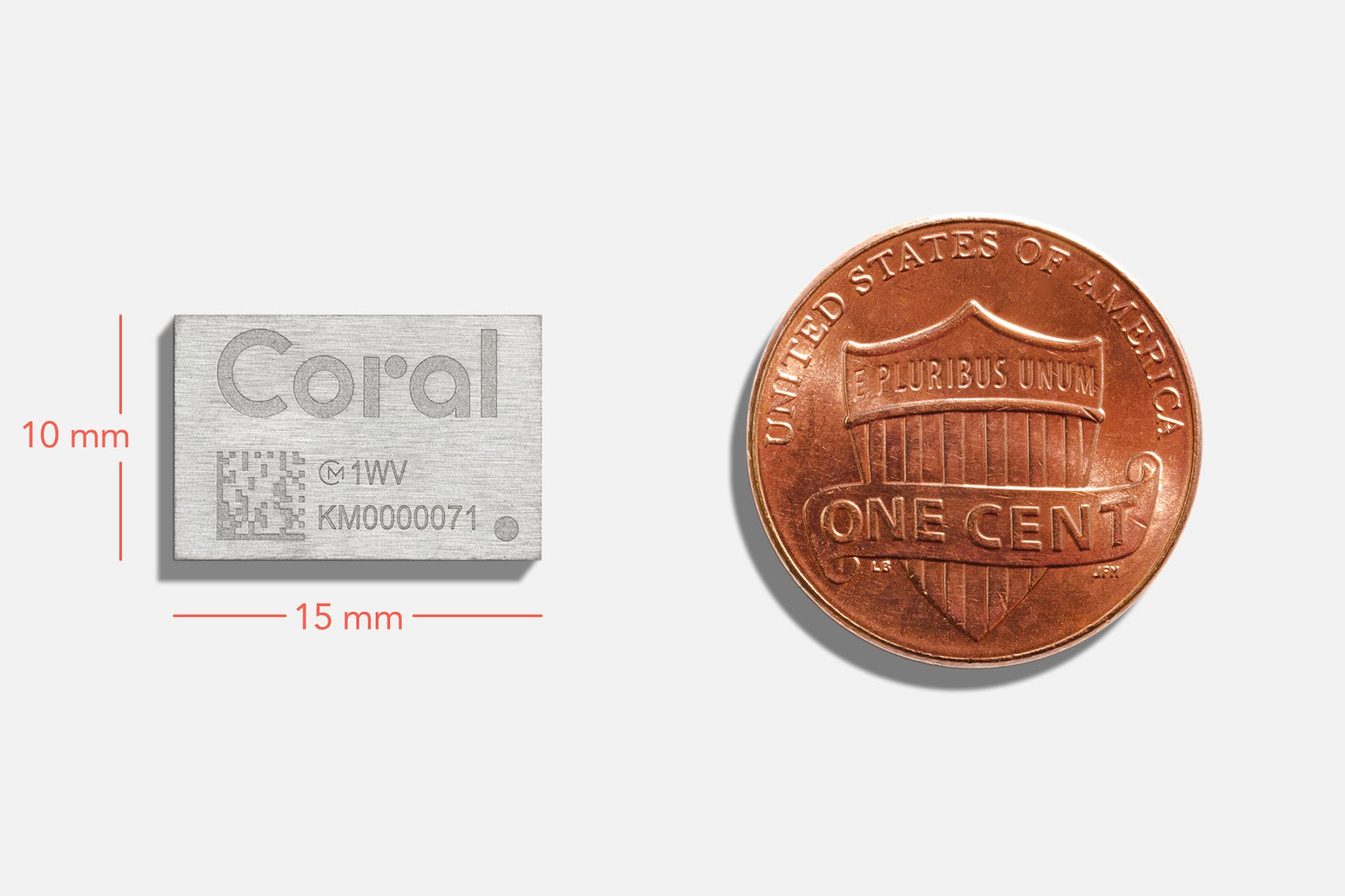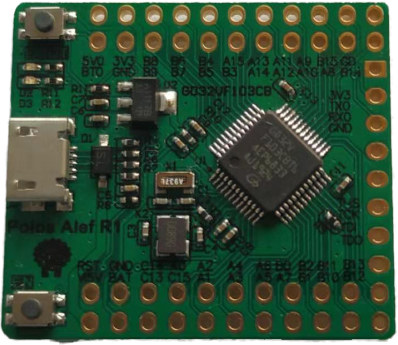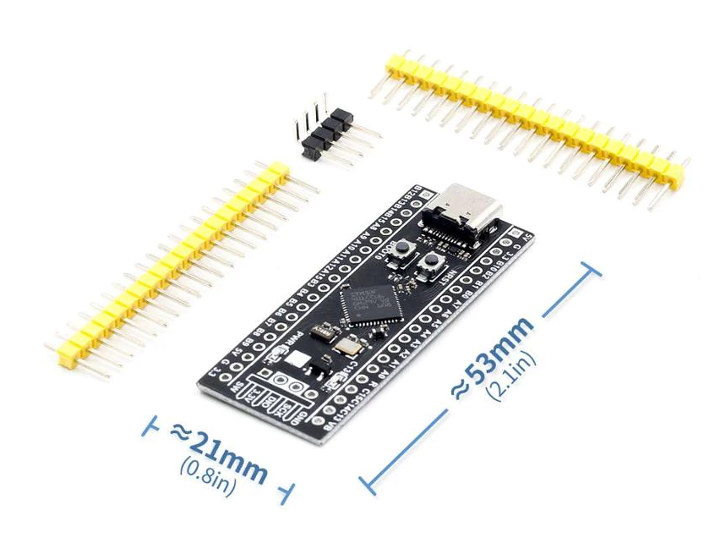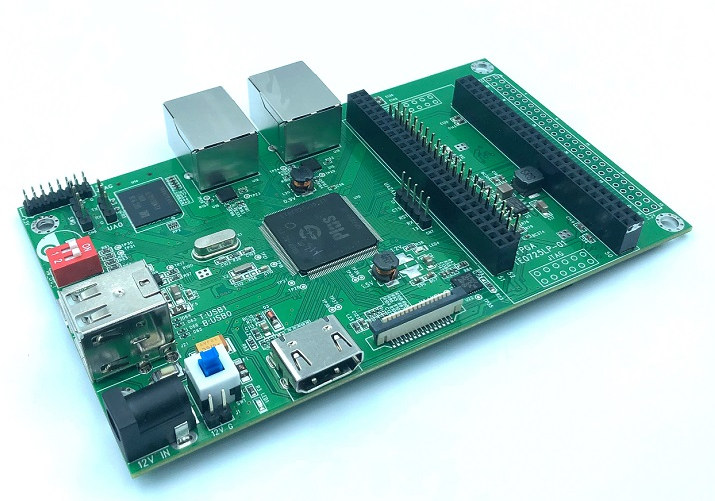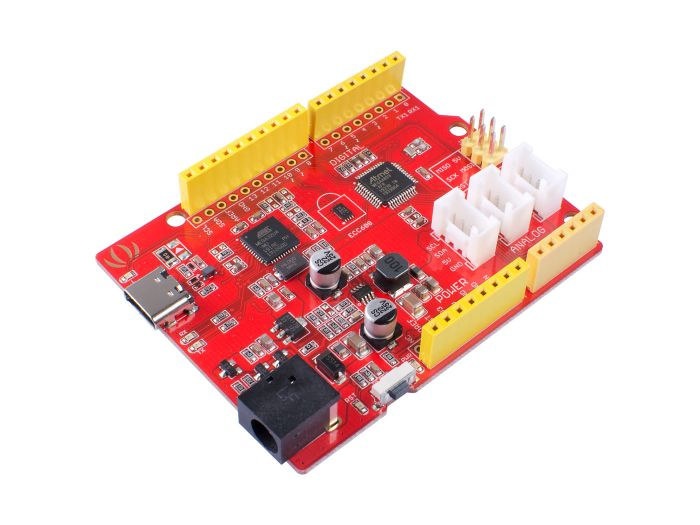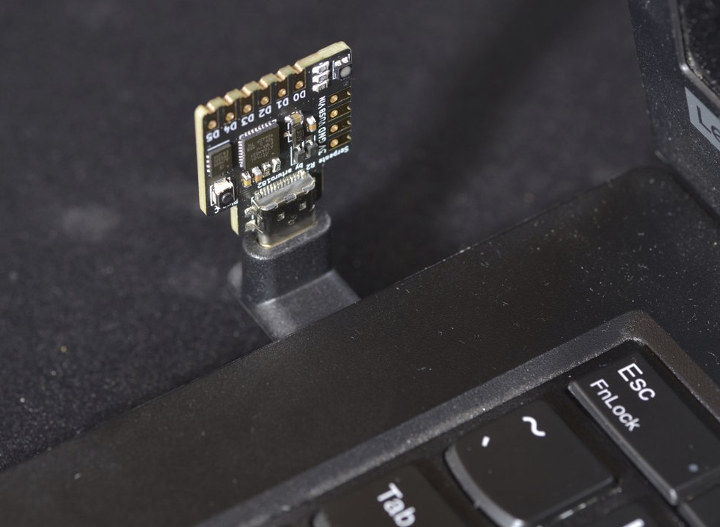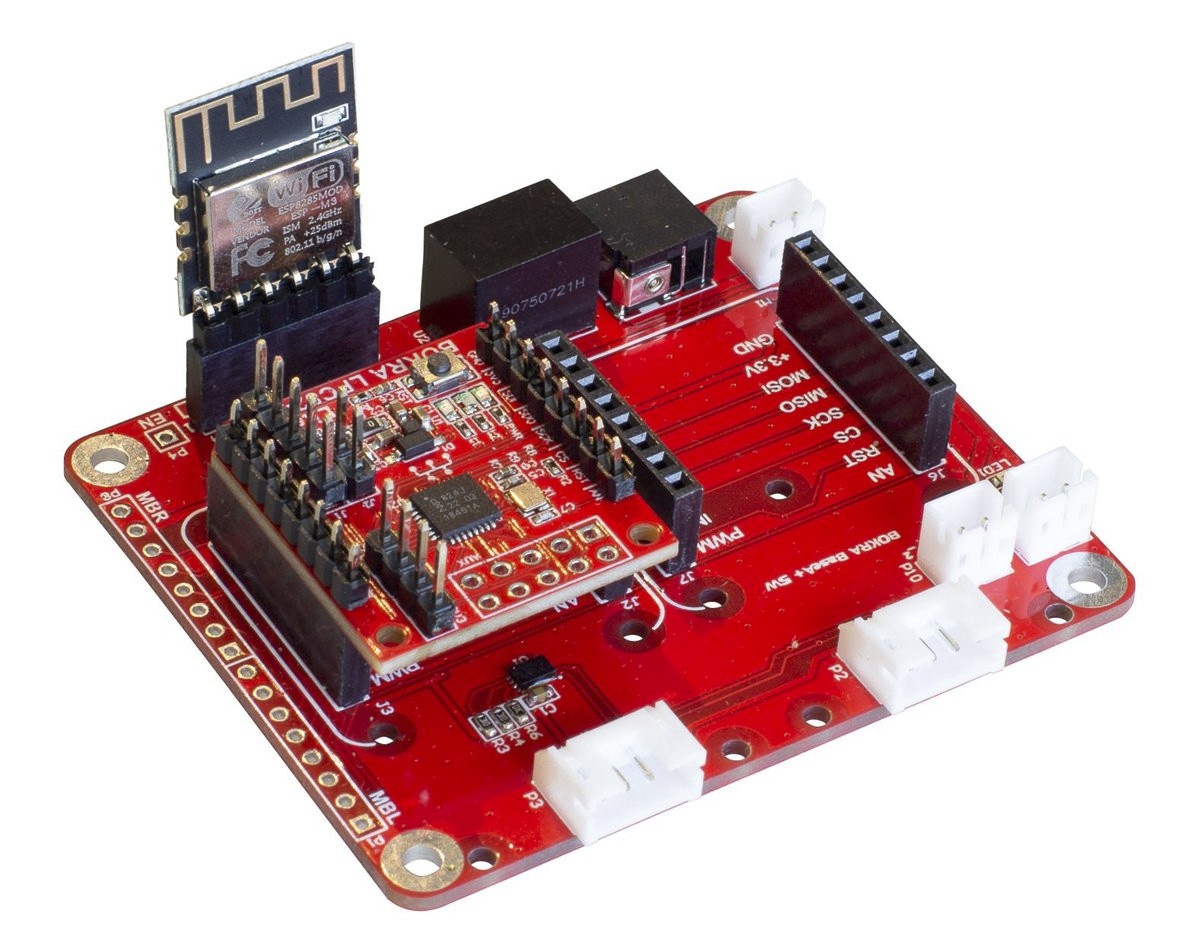NXP has just announced its first i.MX processor with a dedicated neural processing unit (NPU) at CES 2020. The NXP i.MX 8M Plus SoC is built upon the existing i.MX 8M Nano family with a quad-core Arm Cortex-A53 processor running at up to 2GHz, an independent real-time Cortex-M7 microcontroller @ 800MHz, and a Vivante 3D GPU, but adds a 2.3 TOPS NPU to the mix. The NPU will enable advanced machine learning inference at the industrial and IoT (Internet-of-Things) edges for applications such as people and object recognition for public safety, industrial machine vision, robotics, hand gesture, and emotion detection with natural language processing. NXP i.MX 8M Plus key features and specifications: CPU – Quad-core Arm Cortex-A53 processor @ up to 2.0 GHz with 512KB ECC cache Real-time MCU – Arm Cortex-M7 @ up to 800 MHz GPU – Vivante GC7000UL 3D GPU, Vivante GC520L 2D GPU DSP – HiFi […]
Google Coral mPCIe and M.2 Cards for Sale, New Coral Dev Board Mini and Modules Coming in 2020
Google introduced Coral development board and USB accelerator with Google Edge TPU last year. The development board was comprised of a baseboard and Coral system-on-module with an NXP i.MX 8M quad-core Arm Cortex-A53 processor and the Edge TPU. Since then ASUS announced Tinker Edge T and CR1S-CM-A SBC based on the Coral module, and yesterday, I noticed Seeed Studio started selling mPCIe and M.2 AI accelerator card with Google Edge TPU, while today, Google announced upcoming Coral products for 2020. Coral Mini PCIe and M.2 Accelerators Coral Mini PCIe card specifications: Half-mini PCIe card with PCIe Gen2 x1 Supply voltage – 3.3VDC +/- 10 % Dimensions – 30.00 x 26.80 x 2.55 mm Weight – 3.6 g Temperature Range – Storage: -40 ~ 85°C; operating: -20 ~ 70°C Relative humidity – 0 ~ 100% (non-condensing) Op-shock – 100 G, 11ms (persistent); 1000 G, 0.5 ms (stress); 1000 G, 1.0 ms […]
Polos GD32V Alef is a Tiny RISC-V MCU Board Selling for $3
We first found out about GigaDevice GD32V 32-bit RISC-V MCU last summer, as an update/alternative to the earlier STM32 compatible GD32 Arm Cortex-M3 microcontroller from the company with higher performance and lower power consumption, while keeping the price identical. The first low-cost GD32V development board we covered was Longan Nano going for $5 with an OLED display and an acrylic case. If you don’t need either or want to access all pins from the 48-pin MCU, you can now order an even cheaper GD32V RISC-V MCU board with Polos GD32V Alef going for $2.99 on Analoglamb website. Polos GD32V Alef board specifications: MCU – Gigadevice GD32VF103CBT6 32-bit RISC-V (rv32imac) microcontroller @ 108 MHz with 128KB Flash, 32KB SRAM USB – 1x micro USB OTG port for power and programming Expansion – 52 through holes (2.54mm pitch) exposing all pins from the MCU including 3x USART, 2x I2C, 3x SPI, 2x […]
$3 STM32 “Black Pill” Board Features STM32F4 Cortex-M4 MCU, Optional SPI Flash
STM32 “Blue Pill” is a popular, and cheap (>$2) development board based on STMicro STM32F103C8T6 Arm Cortex-M3 microcontroller and programmable with the Arduino IDE. I’ve just been informed the board got an upgrade of sorts with a “Blue Pill 2” board featuring either STM32F401CCU6 or STM32F411CEU6 Arm Cortex-M4F microcontroller, and a USB Type-C port for power and programming. It’s black, so instead, I’ll call Black Bill as some others appear to do. Specifications for the Blue Pill & Black Pill boards (new features in bold): MCU (one of the other) STMicro STM32F103C8T6 ARM Cortex-M3 MCU @ 72 MHz with 64KB flash memory, 20KB SRAM. STMicro STM32F401CCU6 Arm Cortex-M4F MCU @ 84 MHz with 256 KB flash, 64KB SRAM STMicro STM32F411CEU6 Arm Cortex-M4F MCU @ 100 MHz with 512KB flash, 128KB SRAM Storage – Footprint for SPI flash USB Blue Pill – 1x micro USB port for power and programming Black […]
Banana Pi BPI-F2S Industrial SBC Launched for $58 with Linux 4.19 based Debian or Fedora OS
Last month we covered Banana Pi BPI-F2S single board computer (SBC) for industrial, IoT, and smart audio application that was powered by the intriguing SunPlus SP7021 “Plus1” processor featuring four Cortex-A7 cores, one ARM9 ARM9 real-time core, and one 8051 I/O controller core, as well as up to 512MB built-in DDR3 RAM. At the time, the board was not available, and we had limited information about software support, except the company would provide a Yocto-based Linux distribution. The good news is that you can now buy Banana Pi BPI-F2S industrial SBC on Aliexpress for $58 and Taobao for 390 RMB, and the company released source code and OS images for the board. Here’s a reminder of Banana Pi BPI-F2S specifications: SoC – Sunplus SP7021 “Plus1” with a quad-core Cortex-A7 processor @ 1.0 GHz, one Arm A926 microprocessor, an 8051 core to handle I/Os, and 128MB or 512MB DDR3 DRAM. Storage […]
Seeeduino Crypto Board Combines Microchip ATmega4809 MCU and ECC608 Crypto Chip
With the advance of IoT, security has become critical since devices are often connected to the Internet. There are several ways to improve security and one of them is to implement hardware security via crypto chips. One of those chips is Microchip ECC608 (aka ATECC608A) secure element which we previously found in Linux based hardware such as USB Armory MK-II USB Linux computer, and the official Arduino Nano 33 IoT Board. Seeed Studio has now introduced a new Arduino compatible board with Microchip ECC608 crypto chip: Seeeduino Crypto board powered by a Microchip ATmega4809 8-bit AVR MCU. Seeeduino Crypto specifications: MCU – Microchip ATMEGA4809-AFR 8-bit AVR microcontroller @ 16 MHz with 48KB flash, 6,144 Bytes RAM USB – 1x USB Type-C port Expansion Arduino Uno headers with 6x analog inputs, 14x digital I/O pins, 5x PWM 2x I2C Grove headers 1x UART Grove header HW Security – Microchip ECC608 secure […]
Serpente R2 Microchip SAMD21 Board Features a Male USB Type-C Port
Development boards with a USB Type-C port for power and programming are becoming more common, most in most cases with a female USB-C port. Designed by arturo182, Serpente R2 CircuitPython prototyping board based on Microchip SAMD21 Arm Cortex-M0+ microcontroller offers three USB power & programming option with USB type-A male, USB type-C female, or USB type-C male, with the latter option allowing you to plug into directly into your host computer. Serpente R2 board specifications: MCU – Microchip ATSAMD21E18A 32-bit Cortex-M0+ running at 48MHz, with 256KB flash, and 32KB RAM Storage – 4MB SPI Flash for storing files and CircuitPython code Expansion – 10x I/Os with castellated holes including 6x customizable GPIOs, and 4x power signals (3V, GND, VUSB, and VIN) USB R2 – Female USB Type-C port R2 Plug – Male USB Type-A port R2 Plug C – Male USB Type-C port Misc – User RGB LED, reset button […]
BOKRA NXP LPC824 and Nordic nRF52832 powered MCU Modules Follow MikroBUS Form Factor
We first wrote about MikroElectronika MikroBUS socket in 2015 while covering an SBC which featured one MikroBUS socket supporting one of the 150 Click boards available at the time. There are now over 700 Click boards to choose from, with the tiny modules offering motor drivers, buttons, short-range connectivity, UART and other interfaces, as well as various sensors. But BOKRA had another idea: developing MCU based systems-on-module following MikroBUS form factor. BOKRA LPC824 Lite module The first of those modules is BOKRA LPC824 Lite with the following specifications: MCU – NXP LPC824M201JHI33 Arm Cortex-M0+ microcontroller @ 30 MHz with 32KB Flash Memory, 8 KB RAM I/O MikroBUS headers with SPI, I2C, UART, PWM, GPIOs 10-pin “Serial” header 4-pin I2C Grove connector for Seeed Studio I2C Grove modules Debugging interface – SWD Misc – Reset button, power LED, 2x user LEDs Power Supply – 5V/500mA via MIC5528 regulator Dimensions – 28.6 […]


